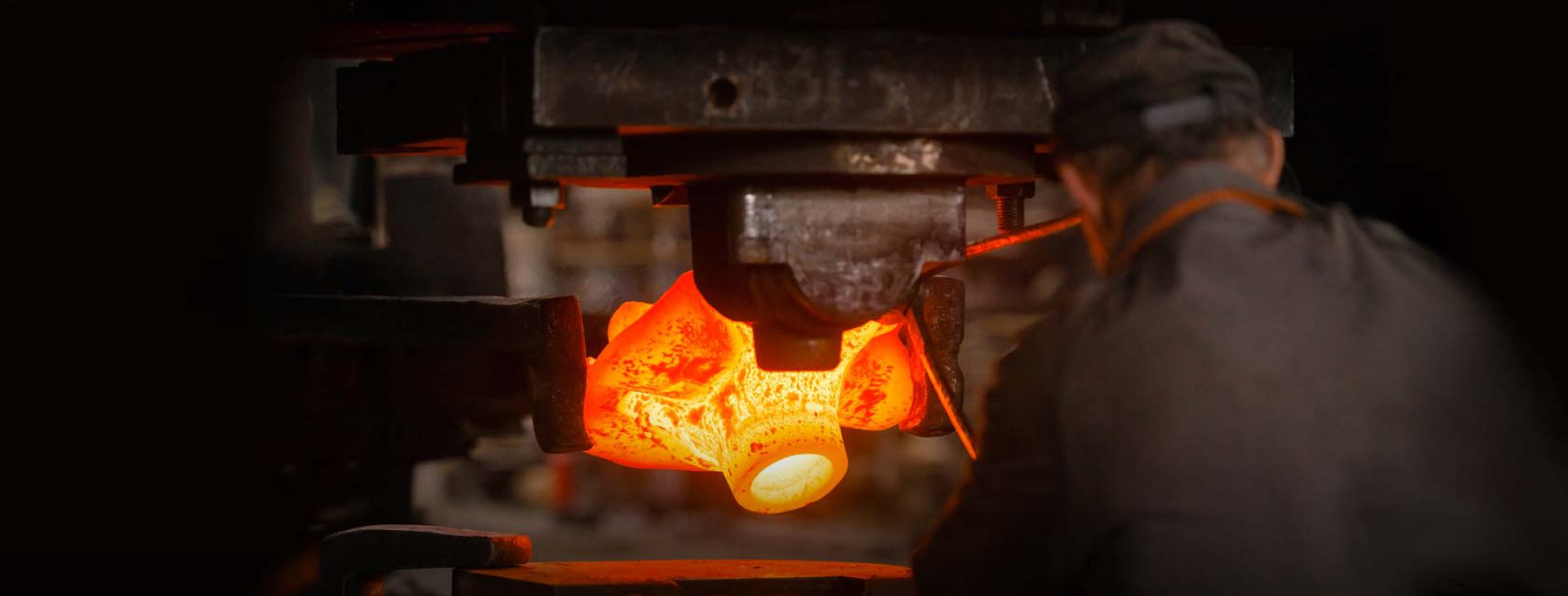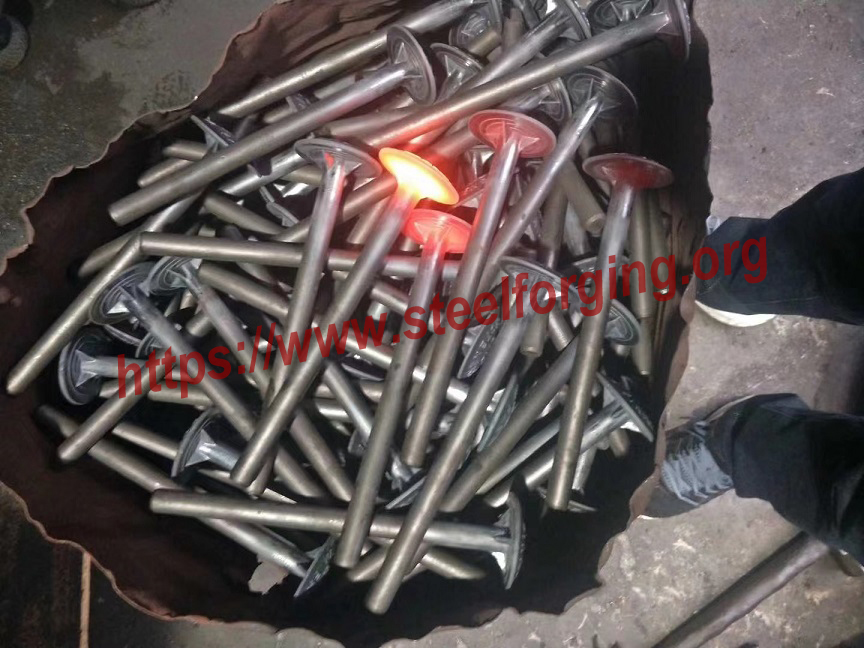Stainless steel offers excellent resistance to corrosion and high temperatures because it contains low levels of carbon and chromium. When the fasteners are exposed to a corrosive environment, there is nothing better than stainless steel fasteners. They are non-magnetic and offer low thermal and electrical conductivity.
When forming a new shape from raw stainless steel, its initial integral grain is first deformed to fit the unique overall shape. This results in continuous grain production throughout the part, and the new part is produced with improved strength characteristics. Forging produces stainless steel fasteners stronger than an equivalent cast or machined fasteners. For this reason, forged stainless steel fasteners are preferred when the safety and reliability are a priority.
What are Forged Stainless Steel Fasteners?
Forging is a manufacturing process in which a metal is shaped by applying pressure and heat to deform the material. Forged stainless steel fasteners are made using this process, which involves shaping the steel at a high temperature and then cooling it down to make it stronger. The forging process aligns the grain structure of the metal, making it stronger and more durable. The resulting fasteners are used in high-stress applications where strength and durability are critical.
Common Grades of Forged Stainless Steel Fasteners
Most stainless steels are austenitic, commonly called the 300 series. Many compositions are available in this series, but we primarily use types 304 and 316 because they are exceptionally corrosion-resistant. They differ only in the proportion of chromium and nickel and in the environments in which they are used.
When looking for 304 series stainless steel fasteners, you may come across the term “18-8”. This term indicates the presence of 18% chromium and 8% nickel in the steel. Most 300 series fasteners have this 18-8 composition. However, it is not necessarily present in Type 304. Type 304 is one of the most popular fasteners in the 300 series and offers the best corrosion resistance.
Type 316 is somewhat less popular than Type 304 but offers excellent corrosion resistance. Like 304, type 316 does not have that 18-8 ratio. The concentration is 16-10, referring to 16% chromium and 10% nickel; it also contains 2% molybdenum. The molybdenum is added to gain superior resistance to chlorides that cause pitting. Type 316’s composition provides high strength, so we primarily use it in highly corrosive environments such as chemicals, solvents, or saltwater. Type 316 stainless steel fasteners are handy in abrasive chemicals or direct salt spray applications.
Manufacturing Process of Forged Stainless Steel Fasteners
The manufacturing process of forged stainless steel fasteners involves several steps, which include:
- Raw material selection: The first step in the manufacturing process is to select high-quality raw materials. Stainless steel is the primary material used to make forged stainless steel fasteners, and it should be selected based on its composition, quality, and strength.
- Heating: The raw material is heated to a high temperature, typically between 1100°C and 1200°C, in a furnace. Heating the metal to this temperature makes it more malleable and easier to shape.
- Forging: Once the metal has reached the desired temperature, it is placed on a forging press, which applies pressure to shape the metal into the desired shape. The process of forging involves shaping the metal by hammering, pressing, or rolling it into the desired shape.
- Heat Treatment: After the forging process, the metal is subjected to heat treatment to make it stronger and more durable. The heat treatment process involves heating the metal to a high temperature and then cooling it down rapidly. This process is known as quenching, and it helps to align the grain structure of the metal, making it stronger and more resistant to corrosion.
- Machining: After heat treatment, the metal is machined to the final shape and size of the fastener.
Common Types of Forged Stainless Steel Fasteners
Forged stainless steel fasteners come in a variety of shapes and sizes to meet different needs in various industries. Here are some of the most common types of forged stainless steel fasteners:
- Forged stainless steel eye bolts: Eye bolts are used to attach cables, ropes, and chains to objects. They have a loop or eye at one end that can be used to attach the bolt to a surface or object. Forged stainless steel eye bolts are commonly used in construction, marine, and aerospace industries.
- Forged stainless steel square bolts: Square bolts have a square-shaped head and are used in applications where a wrench or pliers are required for tightening. These bolts are commonly used in construction, automotive, and machinery industries.
- Forged stainless steel T-head bolts: T-head bolts have a T-shaped head and are commonly used in applications where a bolt needs to be tightened from one side only. They are commonly used in machinery, automotive, and construction industries.
- Forged stainless steel hex nuts: Hex nuts have six sides and are commonly used with bolts and screws to secure objects. Forged stainless steel hex nuts are commonly used in construction, automotive, and marine industries.
- Forged stainless steel coupling nuts: Coupling nuts are used to join two threaded rods or bolts together. They have a hexagonal shape and are commonly used in construction, automotive, and machinery industries.
- Forged stainless steel wing nuts: Wing nuts have two “wings” on either side that can be turned by hand to tighten or loosen the nut. They are commonly used in applications where quick adjustments or removal is required, such as in furniture assembly or lighting fixtures.
- Other forged stainless steel fasteners: Other types of forged stainless steel fasteners include U-bolts, J-bolts, carriage bolts, stud bolts, and socket head cap screws. Each of these fasteners has its unique shape and design, making them suitable for specific applications in different industries.
Forged Stainless Steel Fasteners Manufacturer – CFS Forge
CFS Forged is proud to be an internationally renowned stainless steel forging manufacturer for fasteners in China. CFS Forged is an expert in custom forging service for stainless steel fasteners in various shapes and sizes. We can produce any form, from fully customized unique heads to standard hex bolts, with amazing results. This is only possible because of our in-house tooling department.
We have modern forging technology, which enables us to offer high-quality, long-lasting stainless steel fasteners at affordable prices to all our clients worldwide. You can trust our products for the best quality, performance, and reliability.
With our manufacturing technologies, you can monitor the direct load in the fastener during service. This technology will revolutionize your application. You can save money if you know precisely what your fasteners are doing under load. It will help you ensure joint integrity reduce downtime, and equipment safety. We are a China-based manufacturer that assures you of quality and promises to focus on solving problems and doing so in a first-class manner.
If you want to know more about our services, contact us now to request a free quote!


